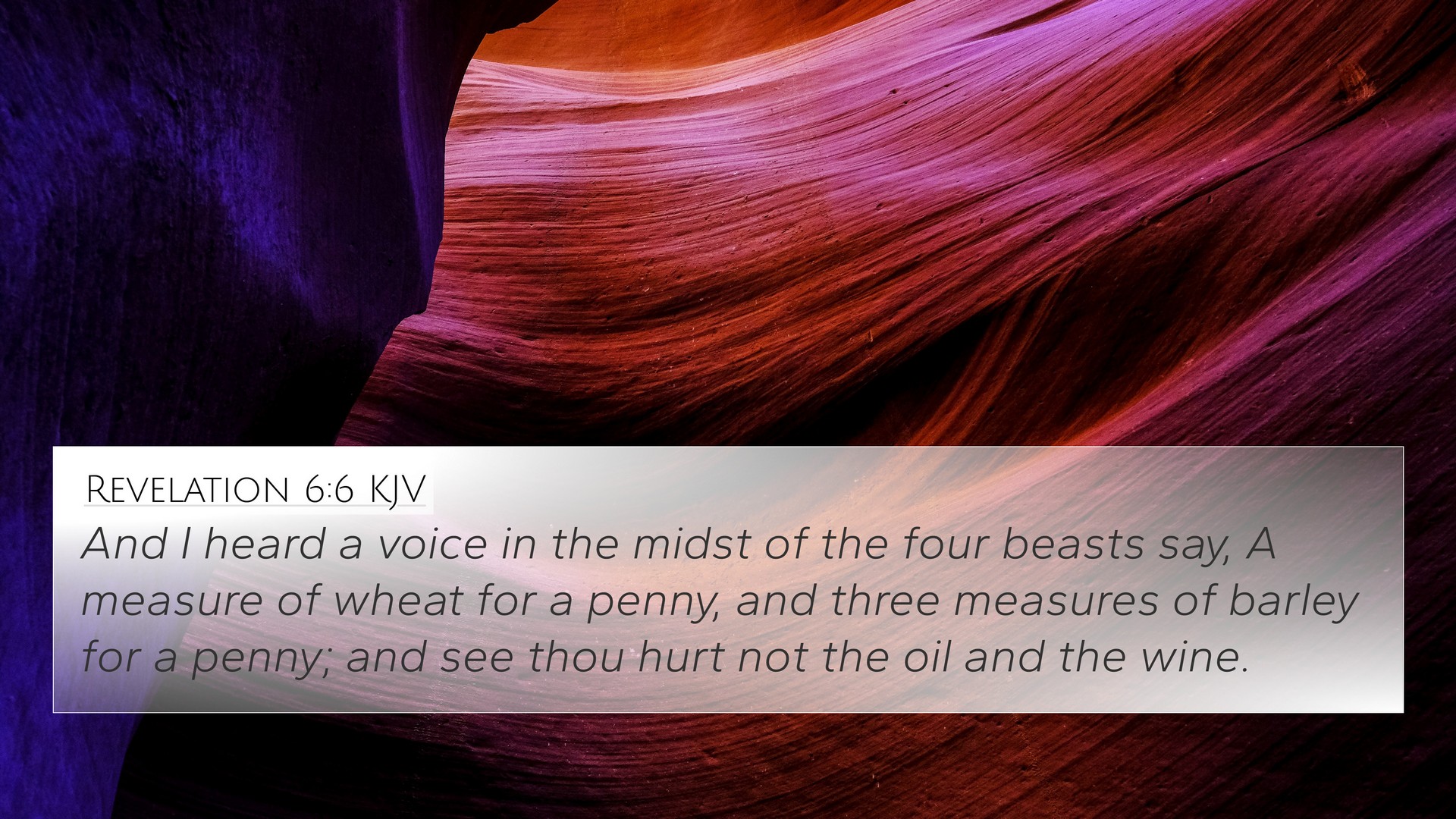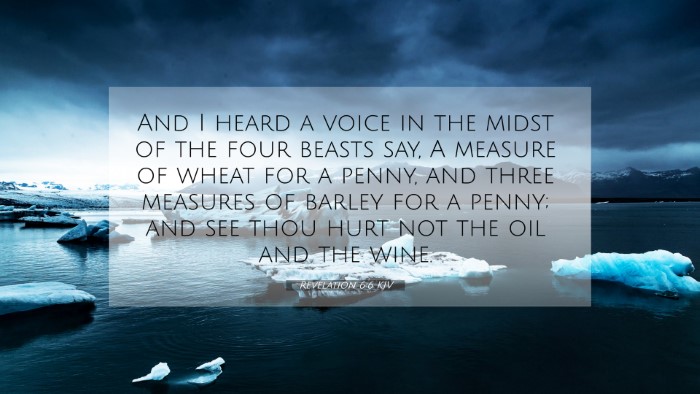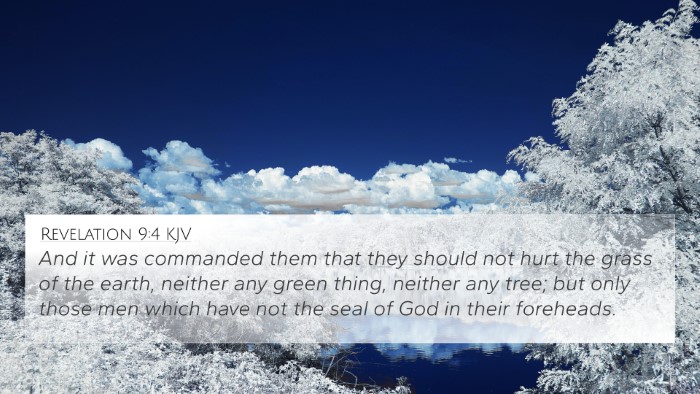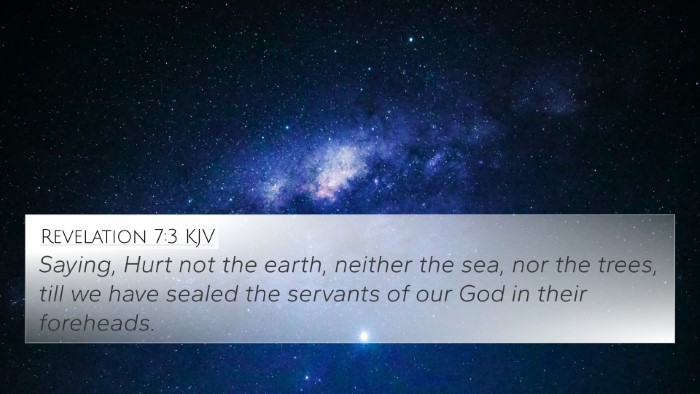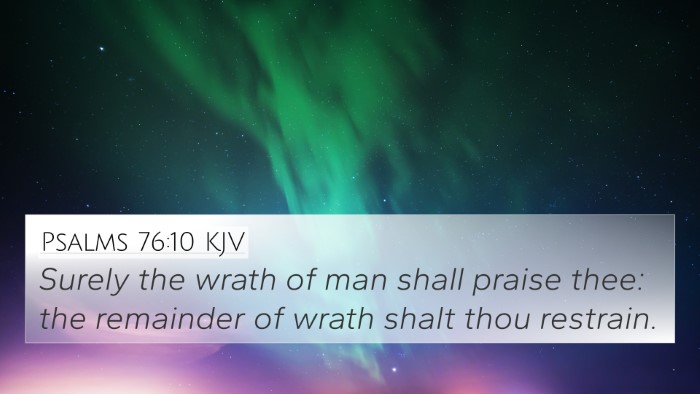Understanding Revelation 6:6
Revelation 6:6 states:
"And I heard a voice in the midst of the four beasts say, A measure of wheat for a penny, and three measures of barley for a penny; and see thou hurt not the oil and the wine."
This verse reveals important themes of scarcity and economic distress during the apocalyptic events depicted in Revelation. Below, we summarize various interpretations and insights from public domain commentaries.
Key Insights from Commentaries
Matthew Henry's Commentary
Matthew Henry emphasizes the profound economic implications of this verse. The reference to measuring wheat and barley indicates a time of famine where basic necessities are rationed, illustrating God's judgment on the earth. He underlines that the pricing given—a penny for a measure—reflects a significant inflation of prices due to shortages. Furthermore, the mention of oil and wine suggests that while grains are being severely affected, the luxuries remain untouched, hinting at a disparity in suffering among the people.
Albert Barnes' Commentary
Albert Barnes takes a slightly different approach, focusing on the symbolism of the 'four beasts' and the voice that speaks. He interprets the voice as a divine declaration of the economic conditions during the tribulation period. Barnes notes that the specific measures and costs presented symbolize the idea of survival amidst harsh conditions. He also sees the 'oil and wine' as representing blessings that God preserves even in times of complete desolation for a select few, further emphasizing the theme of divine sovereignty over creation.
Adam Clarke's Commentary
Adam Clarke provides a detailed analysis of the agricultural references in this verse. He points out that wheat and barley were staples in ancient diets and that their scarcity signals a severe economic crisis. Clarke suggests that the measurement refers to the great inflation that would occur in times of distress, reflecting a biblical principle where scarcity leads to exorbitant prices. Additionally, he interprets the oil and wine as cultural and spiritual symbols, highlighting God's preservation of the faithful or the remnant during times of tribulation.
Bible Verse Cross-References
Many Bible scholars reference multiple scriptures to deepen the understanding of Revelation 6:6. Below are notable cross-references:
- Matthew 24:7 - "For nation shall rise against nation, and kingdom against kingdom: and there shall be famines, and pestilences, and earthquakes, in divers places."
(This verse connects to the theme of famine and distress.)
- Luke 12:28 - "If then God so clothe the grass, which is to day in the field, and to morrow is cast into the oven; how much more will he clothe you, O ye of little faith?"
(This verse speaks to divine provision amidst scarcity.)
- Revelation 18:13 - "And cinnamon, and odours, and ointments, and frankincense, and wine, and oil, and fine flour, and wheat, and beasts, and sheep, and horses, and chariots, and slaves, and souls of men."
(Highlights the remnants and contrasting prosperity during judgments.)
- Isaiah 5:10 - "Yea, ten acres of vineyard shall yield one bath, and the seed of an homer shall yield an ephah."
(A prophetic view of severe agricultural failure.)
- James 5:1-5 - "Go to now, ye rich men, weep and howl for your miseries that shall come upon you."
(Addresses the theme of judgment and economic collapse.)
- Psalm 104:15 - "And wine that maketh glad the heart of man, and oil to make his face to shine, and bread which strengtheneth man's heart."
(Contrasts with the scarcity of essential commodities in Revelation.)
- Deuteronomy 28:47-48 - "Because thou servedst not the Lord thy God with joyfulness, and with gladness of heart, for the abundance of all things; therefore shalt thou serve thine enemies, which the Lord shall send against thee, in hunger, and in thirst, and in nakedness, and in want of all things."
(Shows consequences of disobedience leading to scarcity.)
- Ecclesiastes 12:3 - "In the day when the keepers of the house shall tremble, and the strong men shall bow themselves, and the grinders cease because they are few, and those that look out of the windows be darkened."
(Speaks to a time of reflection during famine.)
- 1 Timothy 6:8 - "And having food and raiment let us be therewith content."
(Connects to the themes of basic survival amidst turmoil.)
Connections Between Bible Verses
Understanding Revelation 6:6 requires examining the connections between various scriptures that speak about discrimination, famine, and God's providence. The above cross-references collectively contribute to a thematic understanding, elucidating the consequences of sin, God's judgment, and the contrast of scarcity versus spiritual abundance.
Tools for Bible Cross-Referencing
To effectively engage with scripture analysis, employing tools for Bible cross-referencing is beneficial. Here are a few resources that can aid in deeper study:
- Bible Concordance: A comprehensive index of words and phrases found in the Bible that aids in identifying scriptures of interest.
- Bible Cross-Reference Guide: Provides thematic links between verses across both Old and New Testaments.
- Cross-Reference Bible Study: A method of examining parallel scriptures to gain insights into biblical themes.
- Comprehensive Bible Cross-Reference Materials: Utilize commentaries and study Bibles that include built-in cross-reference systems for added convenience.
Conclusion
Revelation 6:6 is a profound reminder of the severe realities of judgment and scarcity depicted in apocalyptic literature. By engaging with resources to understand cross-references, scholars and believers can appreciate the interconnectedness of biblical themes. This supports a richer theological dialogue and fosters a deeper appreciation for Scripture's intertwined narratives.
